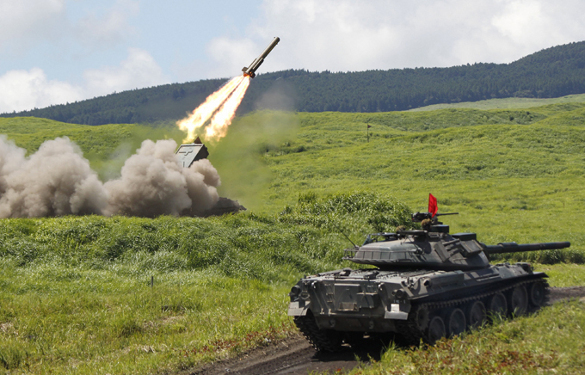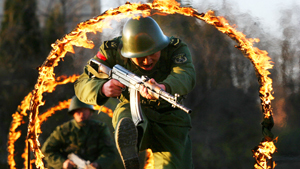Japan on the way to revive its army
Japanese Defence Minister Tomomi Inada said that she did not exclude a possibility for Japanese self-defence forces to strike "enemy bases." The statement was made after North Korea conducted another launch of its missiles in the direction of Japanese Islands. Tokyo thus demonstrates a desire to abandon restrictions in the field of defence that the country undertook after WWII.

In order to understand the truly revolutionary statement from the Japanese Minister of Defence, one needs to look into the Constitution of the Land of the Rising Sun. Chapter Two, "Waiver of War," contains only one article 9, which reads: "(1) Aspiring sincerely to an international peace based on justice and order, the Japanese people forever renounce war as a sovereign right of the nation and the threat or use of force as means of settling international disputes. (2) In order to accomplish the aim of the preceding paragraph, land, sea, and air forces, as well as other war potential, will never be maintained. The right of belligerency of the state will not be recognised."
How can Japan combine complete rejection of the right of the nation to wage war and the intention to attack someone else's territory? The answer to this question remains a mystery. In order to be able to conduct such attacks, Japan must first erase Chapter 2 of its fundamental law.
Japan can do it.
Tokyo has long been running a peculiar policy to "circumvent" constitutional restrictions on military activities. Let's take, for example, ground troops, naval and air forces that Japan pledges to "never maintain" even though the country has all those forces. The difference lies in words - this is not an army, but self-defence forces. Japanese self-defence forces were established in 1954 after the war in Korea.
Currently, Japanese "self-defence forces" are ranked sixth in the world and second in the region (after the Chinese army). They are armed with state-of-the-art weapons and equipment on land, at sea and in the air.
In 1987, the Japanese government abandoned restrictions on the size of the military budget, which until then was not supposed to exceed one percent of the country's GDP. In 2017, Japan will spend a record of $43.66 billion for the needs of its "army."
In 2004, Japanese soldiers were sent to Iraq, where they, however, did not take part in hostilities. Nevertheless, it was not their first mission outside Japan without a sanction from the UN.
In September 2015, a truly epoch-making event occurred. The upper house of the Japanese parliament authorised the use of "self-defence forces" outside Japan. The decision thus nullified the non-military, neutral status of Japan that the country had held for 70 years. Noteworthy, the decision was made by Shinzo Abe, who currently chairs the Japanese government.
Since that time, Japan has received a legal opportunity to provide military-technical assistance to the Republic of Korea (in case of attack from the DPRK), shoot down North Korean missiles launched in the direction of the United States (before the law was adopted, the Japanese missile defence system could shoot down missiles only if they were directed towards Japan), participate in operations to free hostages (Japanese citizens outside the country), provide and enjoy unlimited military support from the US and other allies, conduct military operations to protect navigable routes.
Now, judging by what the Japanese Defence Minister said, "self-defence forces" of Japan should be given the right to strike "enemy bases" at Tokyo's independent decision. In fairness, it must be said that it goes about preventive strikes only.
One shall assume that North Korea was pleased to hear what the Japanese Defence Minister said. Japan thus gave North Korea a reason to increase the military potential. China will most likely follow the example of North Korea too. It brings up an idea that Northeast Asia is launching an arms race. Russia should handle the current events in the region seriously and responsibly: Russia knows firsthand what the Japanese army is capable of.
Dmitry Nersesov
Pravda.Ru
Read article on the Russian version of Pravda.Ru
Subscribe to Pravda.Ru Telegram channel, Facebook, RSS!



